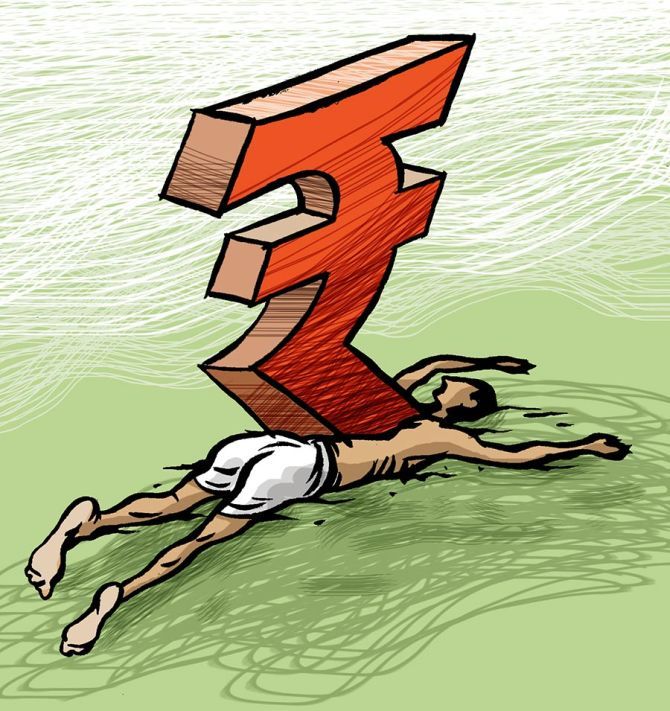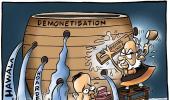'That will affect the economy, employment, agriculture, and ultimately, youngsters, the working class and job opportunities.'
Illustration: Dominic Xavier/Rediff.com

"The Budget session is slated for eight to nine days. In my political career, I have never seen such a short Budget session," Nationalist Congress Party chief Sharad Pawar tells Sanjay Jog.
The Supreme Court has outlawed political parties seeking votes in the name of religion, caste, race, community or language. How do you read this?
It is a path-breaking order.
However, there are a lot of issues that need to be looked into, as the apex court has clearly said that seeking votes in the name of religion, caste, race, community or language is illegal.
In such a situation, what will happen to those seeking votes in the name of language, say, Marathi (without naming the Shiv Sena or the Maharashtra Navnirman Sena).
Besides, there is religion in the name of certain political parties, namely the Hindu Mahasabha and the Muslim League.
We need to consult legal luminaries on the impact of the apex court order.
What is your view on demonetisation?
It looks like there was no proper preparation.
When somebody takes such a major decision, that authority has to keep an alternative plan absolutely ready.
If you are going to demonetise practically 86 per cent of the currency in the country and you have not provided an alternative, then there will definitely be a crisis.
There will be chaos. We are facing that situation now.
The only thing is people are not reacting. Everybody is keeping quiet. I am not worried about that.
I can tell you one thing: When Indira Gandhi announced the Emergency, initially, there was no reaction, barring from a few political leaders.
However, it is in the elections that people across the country react differently. They even defeated Indira Gandhi and a new government came to power.
A similar situation prevails now and we are going in that direction.
Will it impact the BJP's poll prospects in the assembly elections in five states?
I can't say. But I can definitely say that demonetisation will adversely impact the Indian economy and ultimately affect common citizens.
If 86 per cent of the currency is removed, it is bound to affect the system, if alternative arrangements are not offered after six months or a year.
In case of industry, it won't be able to revive itself in even six months; it may take two or three years and its liabilities will increase manifold.
The second important issue is of unemployment.
One of the Mumbai-based industry giants has sacked 20,000 workers.
My colleague and Shiv Sena member of Parliament R N Dhoot, who is associated with the Videocon Group, has informed that it has removed about 2,000 employees.
I know many construction companies, which have started sending notices of a job cut.
Unemployment will be a serious issue if the government does not take corrective action.
If work is not provided, there may be law and order problems that will affect the economy, employment, agriculture, real estate and the construction industry and ultimately, youngsters, the working class and job opportunities.
But the prime minister, in his December 31 address, claimed that demonetisation was a big success and has announced populist measures. What is your comment?
People were quite anxious to know what the future course of action after demonetisation would be; therefore, they were eager to listen to the prime minister's speech on December 31.
However, little has been provided to the common man. Some of the decisions were announced on the eve of the new year, but government notifications for a few were issued in the past.
Will you join the Opposition for a common strategy against the government on the note ban?
A rollback is not possible, as we have gone too far into the process.
However, Opposition parties are discussing the future course of action, especially how to take on the government on demonetisation.
The NCP will fully cooperate with the move.
Some Opposition parties are pressing for postponement of the Budget due to the Election Commission's announcement of assembly polls in five states. Will the Budget influence voters?
The Budget session will begin on January 31. The prime minister has already announced some of the policy decisions and Budget proposals ahead of the presentation of the Budget.
However, these won't have a far-reaching impact. Nor are they aimed at giving much-needed relief to the people, who had faced a lot of hardship due to the note ban.
The Parliament session is slated for eight to nine days.
In my political career, I have never seen such a short Budget session -- I am more concerned about that.
Generally, it is spread over 22 days.
We used to hear about Gujarat's Budget session winding up in just three and four days.
The NCP will speak to other Opposition parties and decide the future strategy in this regard.











